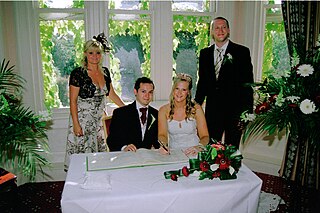Common-law marriage, also known as non-ceremonial marriage, sui iuris marriage, informal marriage, de facto marriage, or marriage by habit and repute, is an irregular form of marriage contract that survives only in a small number of U.S. states and the District of Columbia. In the few jurisdictions where marriage can still be contracted this way, the parties are legally married – and the marriage is legally valid everywhere – despite non-compliance with statutory requirements ; provided the parties have complied with all necessary requirements that apply at common law in the jurisdiction.
A birth certificate is a vital record that documents the birth of a person. The term "birth certificate" can refer to either the original document certifying the circumstances of the birth or to a certified copy of or representation of the ensuing registration of that birth. Depending on the jurisdiction, a record of birth might or might not contain verification of the event by such as a midwife or doctor.
A marriage license is a document issued, either by a religious organization or state authority, authorizing a couple to marry. The procedure for obtaining a license varies between jurisdictions, and has changed over time. Marriage licenses began to be issued in the Middle Ages, to permit a marriage which would otherwise be illegal.

The Civil Partnership Act 2004 is an Act of the Parliament of the United Kingdom, introduced by the Labour government, which grants civil partnerships in the United Kingdom the rights and responsibilities very similar to those in civil marriage. Initially the Act permitted only same-sex couples to form civil partnerships. This was altered to include opposite-sex couples in 2019. Civil partners are entitled to the same property rights as married couples, the same exemption as married couples regarding social security and pension benefits, and also the ability to exercise parental responsibility for a partner's children, as well as responsibility for reasonable maintenance of one's partner and their children, tenancy rights, full life insurance recognition, next-of-kin rights in hospitals, and others. There is a formal process for dissolving civil partnerships, akin to divorce.
Civil partnership in the United Kingdom is a form of civil union between couples open to both same-sex couples and opposite-sex couples. It was introduced via the Civil Partnership Act 2004 by the Labour government. The Act initially permitted only same-sex couples to form civil partnerships, but the law was expanded to include opposite-sex couples in 2019.

The General Register Office for England and Wales (GRO) is the section of the United Kingdom HM Passport Office responsible for the civil registration of births, adoptions, marriages, civil partnerships and deaths in England and Wales and for those same events outside the UK if they involve a UK citizen and qualify to be registered in various miscellaneous registers. With a small number of historic exceptions involving military personnel, it does not deal with records of such events occurring within the land or territorial waters of Scotland, Northern Ireland or the Republic of Ireland; those entities' registration systems have always been separate from England and Wales.

Attitudes in Ireland towards lesbian, gay, bisexual, and transgender (LGBT) people are among the most liberal in the world. Ireland is notable for its transformation from a country holding overwhelmingly conservative attitudes toward LGBT issues, in part due to the opposition by the Roman Catholic Church, to one holding overwhelmingly liberal views in the space of a generation. In May 2015, Ireland became the first country to legalise same-sex marriage on a national level by popular vote. The New York Times declared that the result put Ireland at the "vanguard of social change". Since July 2015, transgender people in Ireland can self-declare their gender for the purpose of updating passports, driving licences, obtaining new birth certificates, and getting married. Both male and female same-sex sexual activity have been legal in the state since 1993. Government recognition of LGBT rights in Ireland has expanded greatly over the past two decades. Homosexuality was decriminalised in 1993, and most forms of discrimination based on sexual orientation are now outlawed. Ireland also forbids incitement to hatred based on sexual orientation.
A legal name is the name that identifies a person for legal, administrative and other official purposes. A person's legal birth name generally is the name of the person that was given for the purpose of registration of the birth and which then appears on a birth certificate, but may change subsequently. Most jurisdictions require the use of a legal name for all legal and administrative purposes, and some jurisdictions permit or require a name change to be recorded at marriage. The legal name may need to be used on various government issued documents. The term is also used when an individual changes their name, typically after reaching a certain legal age.

Marriage is available in England and Wales to both opposite-sex and same-sex couples and is legally recognised in the forms of both civil and religious marriage. Marriage laws have historically evolved separately from marriage laws in other jurisdictions in the United Kingdom. There is a distinction between religious marriages, conducted by an authorised religious celebrant and civil marriages conducted by a state registrar. The legal minimum age to enter into a marriage in England and Wales is now eighteen since 27 February 2023 whereas previously the minimum age of marriage was 16, with parental permission, this also applies to civil partnership.
A marriage certificate is an official statement that two people are married. In most jurisdictions, a marriage certificate is issued by a government official only after the civil registration of the marriage.

The marriageable age is 16 with parental consent but 18 otherwise. Marriage must be between two otherwise unmarried people. If one of the parties wishing to marry is subject to immigration control, notice of marriage can only be given at a register office, which both parties must attend together. The UK Government was obliged, under the Northern Ireland Act 2019, to extend same-sex marriage to Northern Ireland by secondary legislation that took effect on 13 January 2020. Until then, same-sex marriages from other jurisdictions were treated as civil partnerships. Civil partnerships became available to same-sex couples in December 2005 and grant rights and responsibilities identical to civil marriage.
The matrimonial law of Singapore categorizes marriages contracted in Singapore into two categories: civil marriages and Muslim marriages. The Registry of Marriage (ROM) administers civil marriages in accordance to the Women's Charter, while the Registry of Muslim Marriages (ROMM) administers Muslim marriages in accordance to the Administration of Muslim Law Act (AMLA). All marriages performed in Singapore must be registered with the relevant registry in order to be legally valid.

Scots family law is the body of laws in Scotland which regulate certain aspects of adult relationships and the rights and obligations in respect of children.

Lesbian, gay, bisexual, transgender (LGBT) persons in Hong Kong, may face legal challenges not experienced by non-LGBT residents.
India does not recognise registered marriage or civil unions for same-sex couples, though same-sex couples can attain rights and benefits as a live-in couple as per a Supreme Court of India judgement in August 2022.

Marriage in Australia is regulated by the federal government, which is granted the power to make laws regarding marriage by section 51(xxi) of the constitution. The Marriage Act 1961 applies uniformly throughout Australia to the exclusion of all state laws on the subject.

A civil, or registrar, ceremony is a non-religious legal marriage ceremony performed by a government official or functionary. In the United Kingdom, this person is typically called a registrar. In the United States, civil ceremonies may be performed by town, city, or county clerks, judges or justices of the peace, or others possessing the legal authority to support the marriage as the wedding officiant.

Marriage in Ireland (the Republic of Ireland) is a long-standing institution, regulated by various civil and religious codes over time. Today marriages are registered by the civil registration service, and solemnised by a solemniser chosen from a list maintained by Department of Social Protection. The list includes priests, imams, rabbis, humanist celebrants, civil registrars themselves, and others.

The Civil Partnerships, Marriages and Deaths Act 2019 is an Act of Parliament of the United Kingdom which changes civil partnerships to include heterosexual couples, the way in which stillbirths are recorded and how a Coroner's inquest into stillbirths are conducted.









